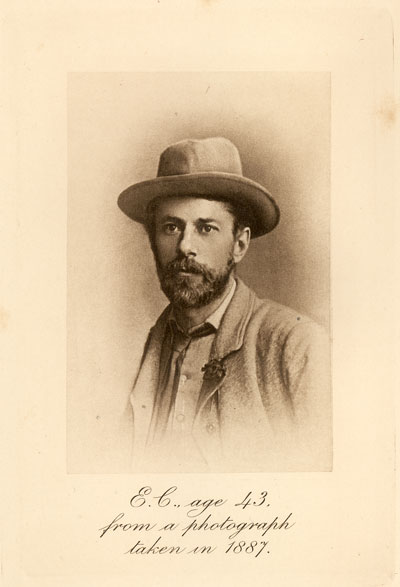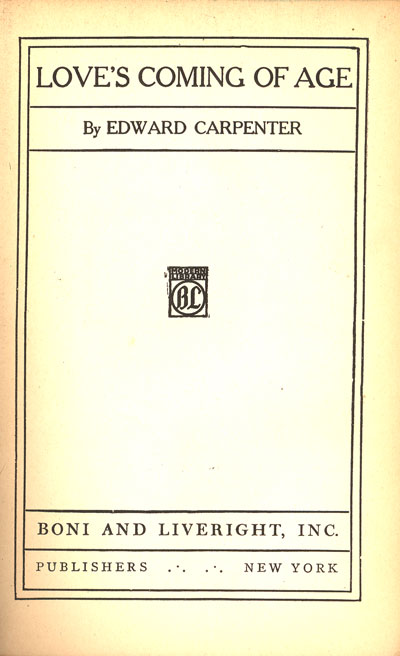Difference between revisions of "Wilson Collection: Edward Carpenter"
(Edward Carpenter) |
(Edward Carpenter) |
||
| Line 11: | Line 11: | ||
After visiting Walt Whitman, English Socialist Edward Carpenter concluded that the Poet “was before all a lover of the Male.”<ref>Jonathan Katz, Gay American History: Lesbians and Gay Men in the U.S.A. (New York: Thomas Y. Crowell, 1976), 365.</ref> | After visiting Walt Whitman, English Socialist Edward Carpenter concluded that the Poet “was before all a lover of the Male.”<ref>Jonathan Katz, Gay American History: Lesbians and Gay Men in the U.S.A. (New York: Thomas Y. Crowell, 1976), 365.</ref> | ||
| − | For Harlem Renaissance poet Countee Cullen, Carpenter's Ioläus “opened up for me soul windows.”<ref>George Chauncey, Gay New York: Gender, Urban Culture, and the Making of the Gay Male World, 1890-1940 (New York: Basic Books, 1994), 284.</ref> And a peek into The Intermediate Sex was for liberationist Harry Hay an “earthshaking revelation.”<ref>Stuart Timmons, The Trouble with Harry Hay: Founder of the Modern Gay Movement (Boston:Alyson Publications, 1990), 27.</ref> | + | For Harlem Renaissance poet Countee Cullen, Carpenter's ''Ioläus'' “opened up for me soul windows.”<ref>George Chauncey, Gay New York: Gender, Urban Culture, and the Making of the Gay Male World, 1890-1940 (New York: Basic Books, 1994), 284.</ref> And a peek into ''The Intermediate Sex'' was for liberationist Harry Hay an “earthshaking revelation.”<ref>Stuart Timmons, The Trouble with Harry Hay: Founder of the Modern Gay Movement (Boston:Alyson Publications, 1990), 27.</ref> |
| − | In Love's Coming of Age (1896) Carpenter wrote, “Love is...its own justification.”<ref>Edward Carpenter, Love's Coming of Age (New York: Boni and Liveright, 1911), 155.</ref> However various its “combinations,” “only in the most exceptional cases, if at all, may public institutions venture to interfere with” it.<ref>Carpenter, 155.</ref> | + | In ''Love's Coming of Age'' (1896) Carpenter wrote, “Love is...its own justification.”<ref>Edward Carpenter, Love's Coming of Age (New York: Boni and Liveright, 1911), 155.</ref> However various its “combinations,” “only in the most exceptional cases, if at all, may public institutions venture to interfere with” it.<ref>Carpenter, 155.</ref> |
==''References''== | ==''References''== | ||
<references /> | <references /> | ||
Revision as of 15:51, 6 November 2012
(Frontis portrait of Edward Carpenter from Towards Democracy: Complete Edition in Four Parts; London: Swan Sonnenschein & Co. Limited / Manchester: S. Clarke, 1907. Also shown is the title page from Love’s Coming of Age, 1911)
Under construction.
Edward Carpenter
After visiting Walt Whitman, English Socialist Edward Carpenter concluded that the Poet “was before all a lover of the Male.”[1]
For Harlem Renaissance poet Countee Cullen, Carpenter's Ioläus “opened up for me soul windows.”[2] And a peek into The Intermediate Sex was for liberationist Harry Hay an “earthshaking revelation.”[3]
In Love's Coming of Age (1896) Carpenter wrote, “Love is...its own justification.”[4] However various its “combinations,” “only in the most exceptional cases, if at all, may public institutions venture to interfere with” it.[5]
References
- ↑ Jonathan Katz, Gay American History: Lesbians and Gay Men in the U.S.A. (New York: Thomas Y. Crowell, 1976), 365.
- ↑ George Chauncey, Gay New York: Gender, Urban Culture, and the Making of the Gay Male World, 1890-1940 (New York: Basic Books, 1994), 284.
- ↑ Stuart Timmons, The Trouble with Harry Hay: Founder of the Modern Gay Movement (Boston:Alyson Publications, 1990), 27.
- ↑ Edward Carpenter, Love's Coming of Age (New York: Boni and Liveright, 1911), 155.
- ↑ Carpenter, 155.

